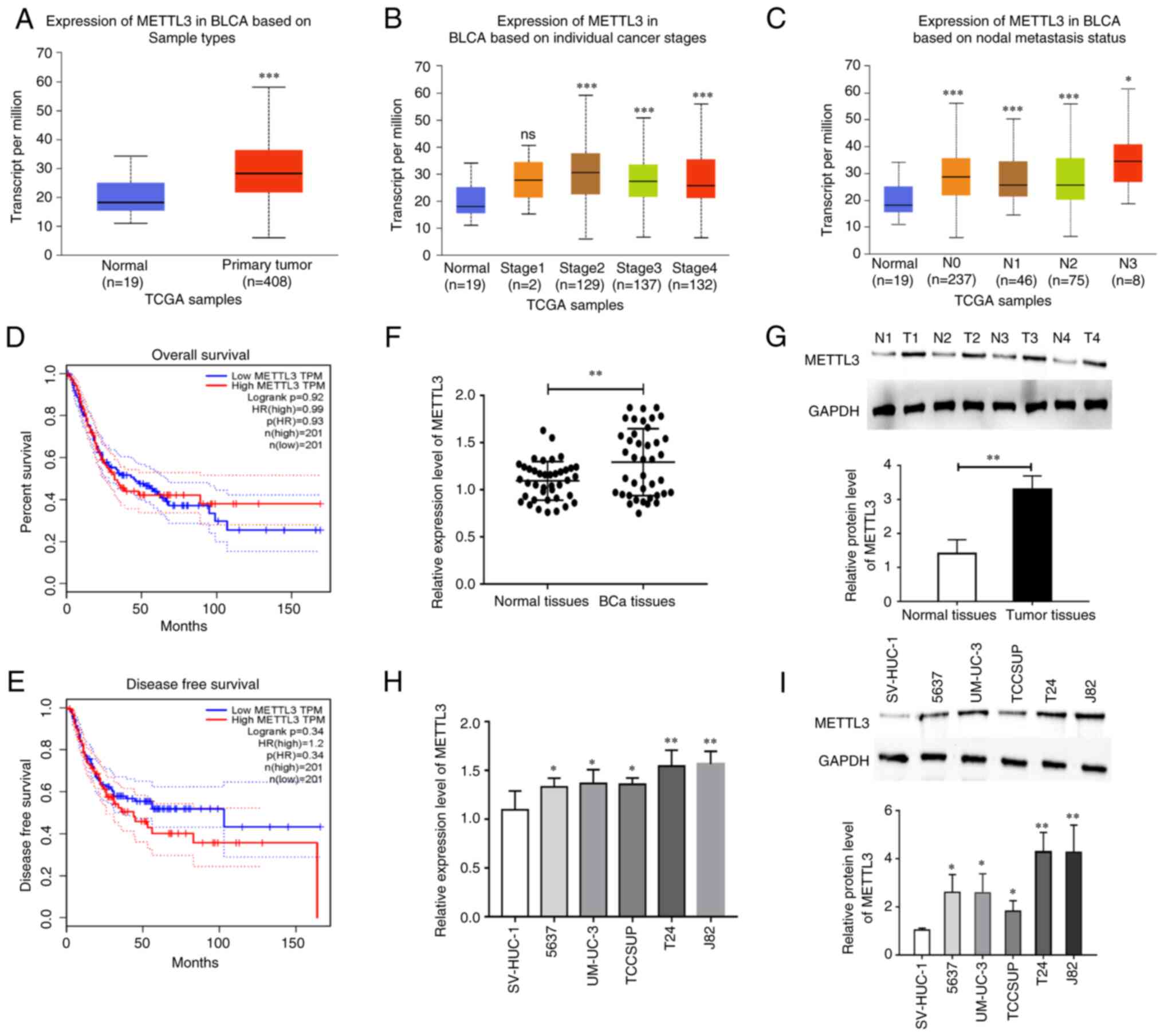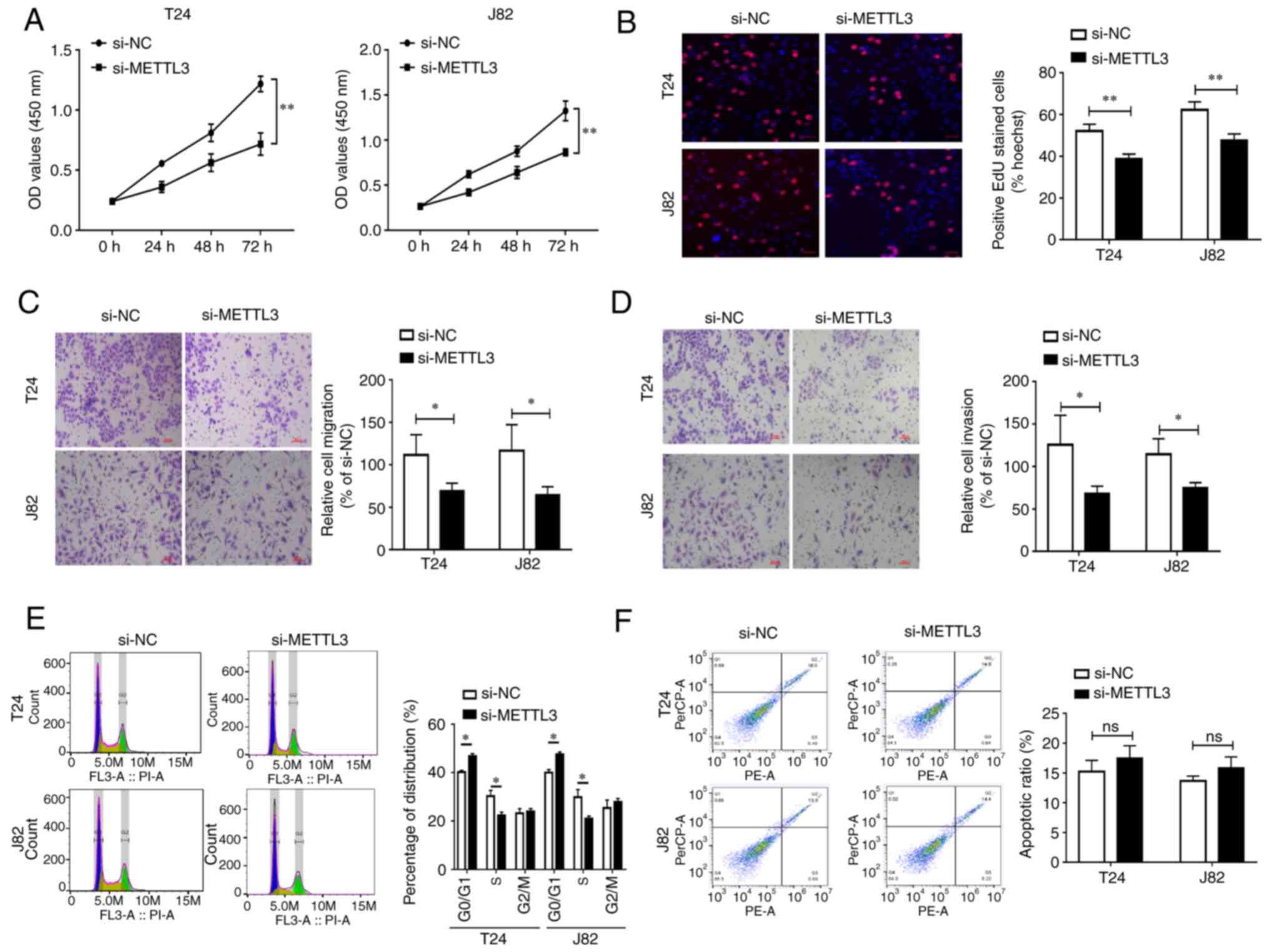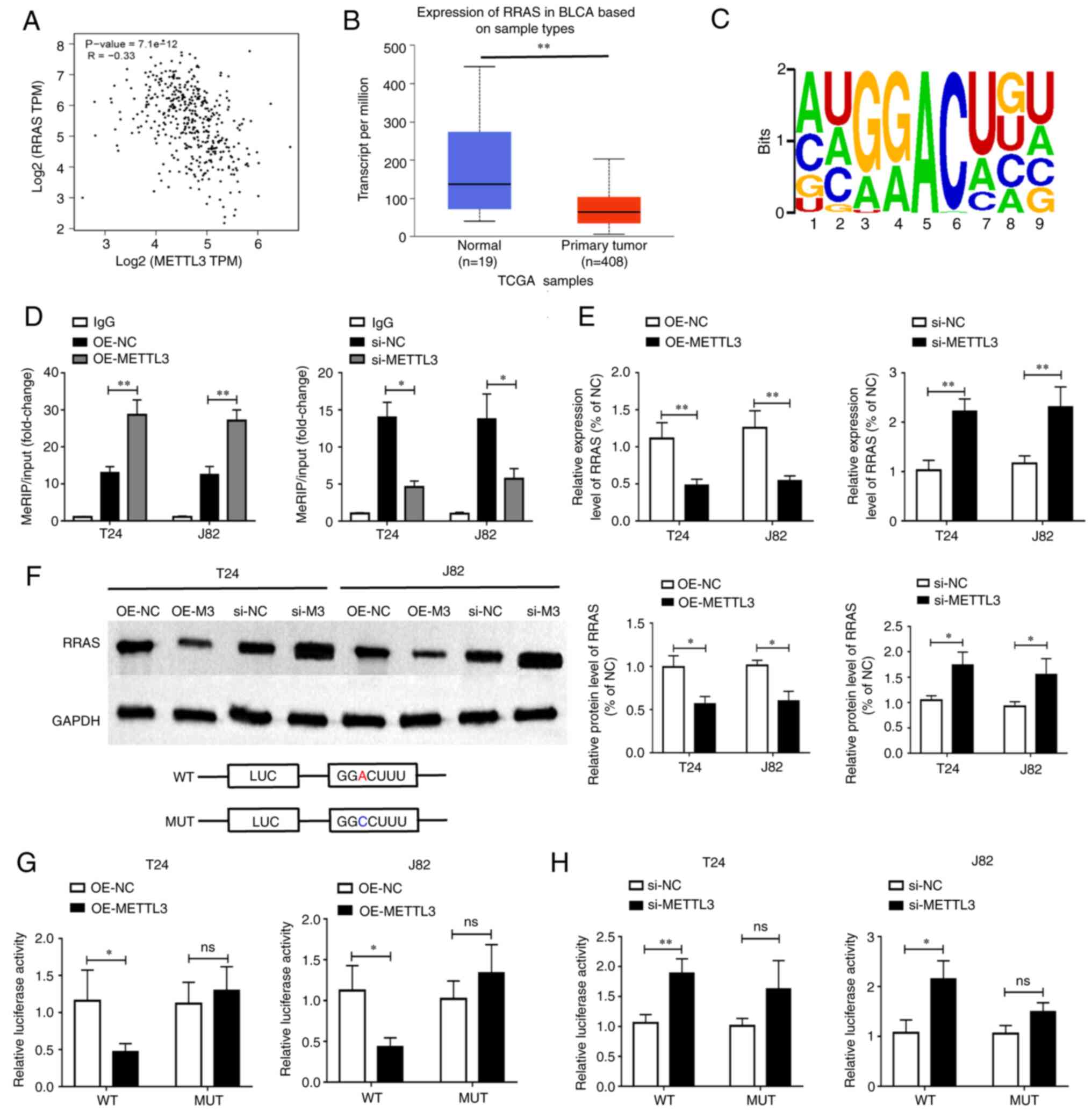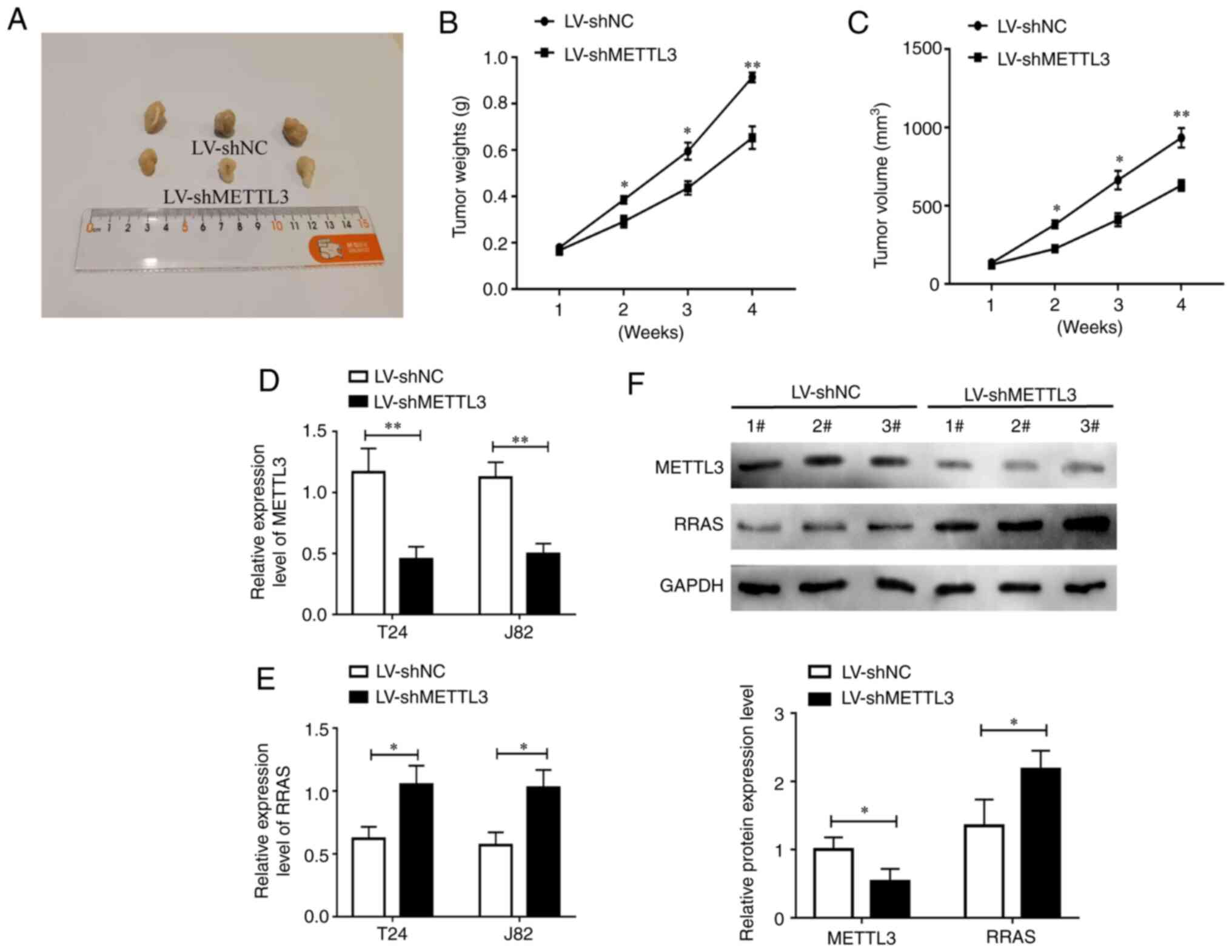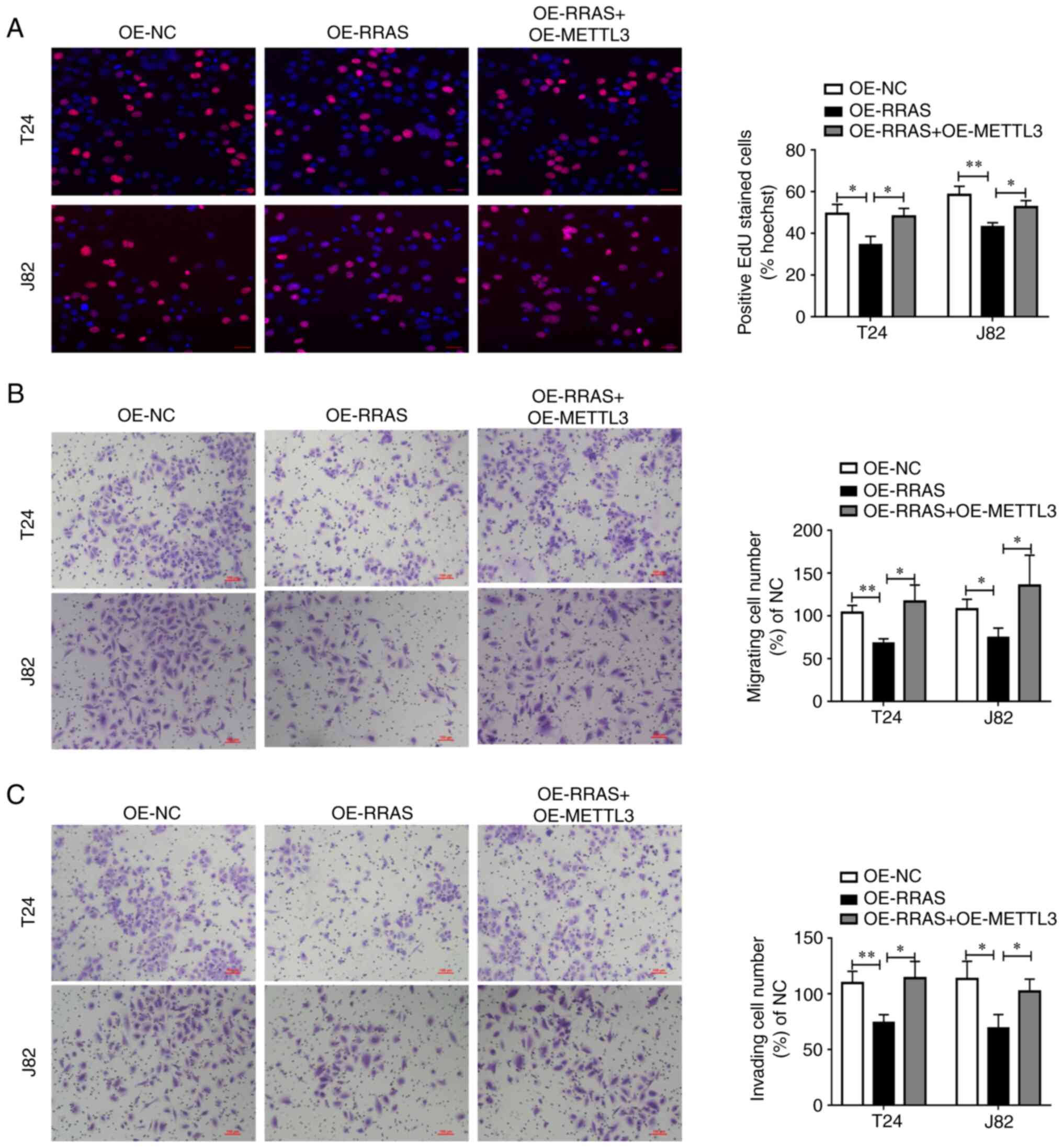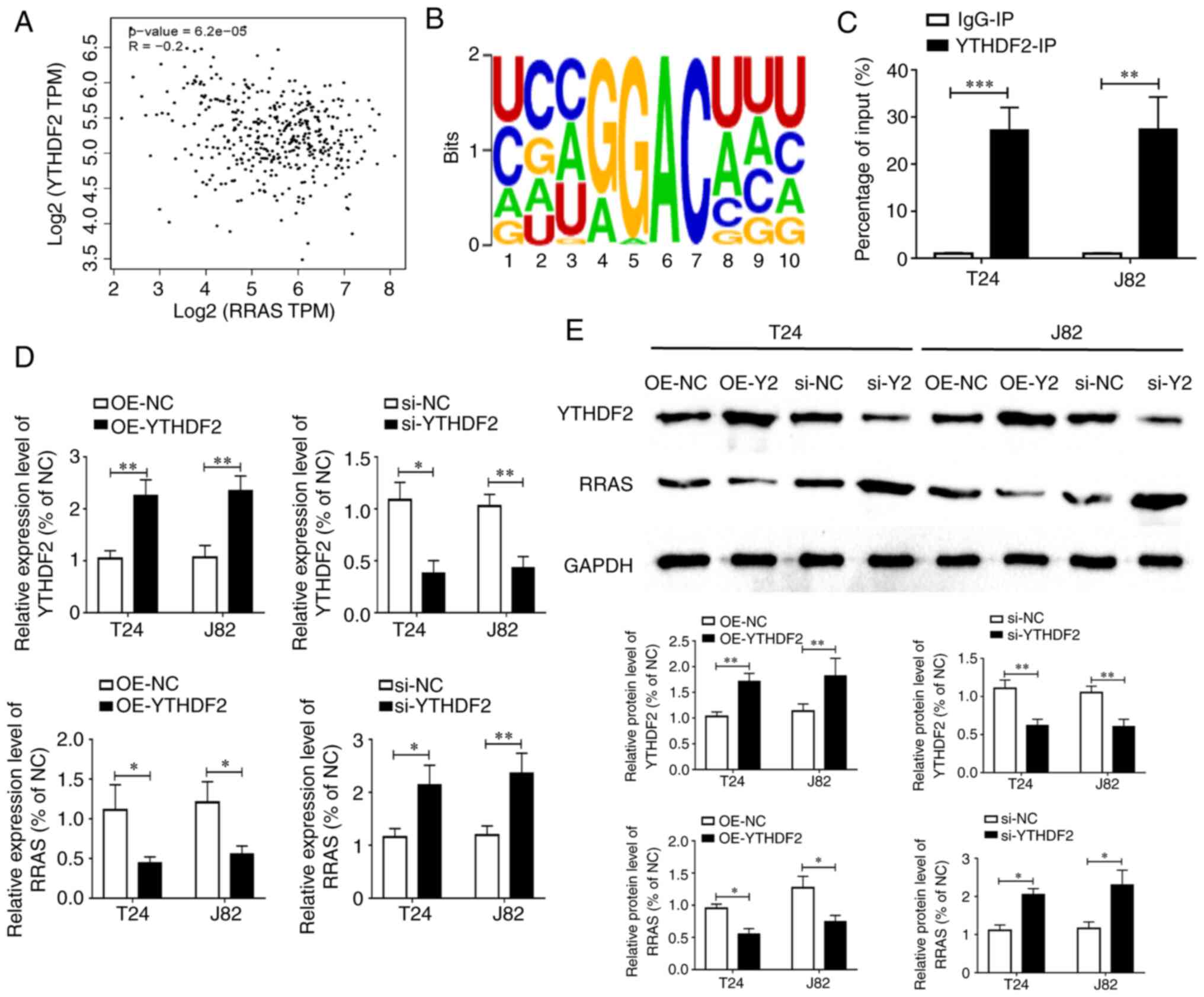|
1
|
Tran L, Xiao JF, Agarwal N, Duex JE and
Theodorescu D: Advances in bladder cancer biology and therapy. Nat
Rev Cancer. 21:104–121. 2021. View Article : Google Scholar : PubMed/NCBI
|
|
2
|
Lenis AT, Lec PM, Chamie K and Mshs MD:
Bladder cancer: A review. JAMA. 324:1980–1991. 2020. View Article : Google Scholar : PubMed/NCBI
|
|
3
|
Patel VG, Oh WK and Galsky MD: Treatment
of muscle-invasive and advanced bladder cancer in 2020. CA Cancer J
Clin. 70:404–423. 2020. View Article : Google Scholar : PubMed/NCBI
|
|
4
|
Joensen UN, Maibom SL and Poulsen AM:
Surgical management of muscle invasive bladder cancer: A review of
current recommendations. Semin Oncol Nurs. 37:1511042021.
View Article : Google Scholar : PubMed/NCBI
|
|
5
|
Witjes JA, Bruins HM, Cathomas R, Compérat
EM, Cowan NC, Gakis G, Hernández V, Linares Espinós E, Lorch A,
Neuzillet Y, et al: European association of urology guidelines on
muscle-invasive and metastatic bladder cancer: Summary of the 2020
guidelines. Eur Urol. 79:82–104. 2021. View Article : Google Scholar : PubMed/NCBI
|
|
6
|
Nason GJ, Ajib K, Tan GH and Kulkarni GS:
Bladder-sparing treatment options in localized muscle-invasive
bladder cancer. Expert Rev Anticancer Ther. 20:179–188. 2020.
View Article : Google Scholar : PubMed/NCBI
|
|
7
|
Nadal R and Bellmunt J: Management of
metastatic bladder cancer. Cancer Treat Rev. 76:10–21. 2019.
View Article : Google Scholar : PubMed/NCBI
|
|
8
|
Alifrangis C, McGovern U, Freeman A,
Powles T and Linch M: Molecular and histopathology directed therapy
for advanced bladder cancer. Nat Rev Urol. 16:465–483. 2019.
View Article : Google Scholar : PubMed/NCBI
|
|
9
|
Jordan B and Meeks JJ: T1 bladder cancer:
Current considerations for diagnosis and management. Nat Rev Urol.
16:23–34. 2019. View Article : Google Scholar : PubMed/NCBI
|
|
10
|
Jia J, Wu S, Jia Z, Wang C, Ju C, Sheng J,
He F, Zhou M and He J: Novel insights into m6A
modification of coding and non-coding RNAs in tumor biology: From
molecular mechanisms to therapeutic significance. Int J Biol Sci.
18:4432–4451. 2022. View Article : Google Scholar : PubMed/NCBI
|
|
11
|
Chen J, Fang Y, Xu Y and Sun H: Role of
m6A modification in female infertility and reproductive system
diseases. Int J Biol Sci. 18:3592–3604. 2022. View Article : Google Scholar : PubMed/NCBI
|
|
12
|
Qu X, Zhang Y, Sang X, Ren D, Zhao H and
Wong STC: Methyladenosine modification in RNAs: From regulatory
roles to therapeutic implications in cancer. Cancers (Basel).
14:31952022. View Article : Google Scholar : PubMed/NCBI
|
|
13
|
Zhang F, Liu H, Duan M, Wang G, Zhang Z,
Wang Y, Qian Y, Yang Z and Jiang X: Crosstalk among m6A
RNA methylation, hypoxia and metabolic reprogramming in TME: From
immunosuppressive microenvironment to clinical application. J
Hematol Oncol. 15:842022. View Article : Google Scholar : PubMed/NCBI
|
|
14
|
Murakami S and Jaffrey SR: Hidden codes in
mRNA: Control of gene expression by m6A. Mol Cell.
82:2236–2251. 2022. View Article : Google Scholar : PubMed/NCBI
|
|
15
|
Shi B, Liu WW, Yang K, Jiang GM and Wang
H: The role, mechanism, and application of RNA methyltransferase
METTL14 in gastrointestinal cancer. Mol Cancer. 21:1632022.
View Article : Google Scholar : PubMed/NCBI
|
|
16
|
Shen D, Wang B, Gao Y, Zhao L, Bi Y, Zhang
J, Wang N, Kang H, Pang J, Liu Y, et al: Detailed resume of RNA
m6A demethylases. Acta Pharm Sin B. 12:2193–2205. 2022.
View Article : Google Scholar : PubMed/NCBI
|
|
17
|
Chen D, Cheung H, Lau HC, Yu J and Wong
CC: N6-methyladenosine RNA-binding protein YTHDF1 in
gastrointestinal cancers: Function, molecular mechanism and
clinical implication. Cancers (Basel). 14:34892022. View Article : Google Scholar : PubMed/NCBI
|
|
18
|
Wu X, Ye W and Gong Y: The role of RNA
methyltransferase METTL3 in normal and malignant hematopoiesis.
Front Oncol. 12:8739032022. View Article : Google Scholar : PubMed/NCBI
|
|
19
|
Li E, Xia M, Du Y, Long K, Ji F, Pan F, He
L, Hu Z and Guo Z: METTL3 promotes homologous recombination repair
and modulates chemotherapeutic response in breast cancer by
regulating the EGF/RAD51 axis. Elife. 11:e752312022. View Article : Google Scholar : PubMed/NCBI
|
|
20
|
Zhu Y, Peng X, Zhou Q, Tan L, Zhang C, Lin
S and Long M: METTL3-mediated m6A modification of STEAP2 mRNA
inhibits papillary thyroid cancer progress by blocking the Hedgehog
signaling pathway and epithelial-to-mesenchymal transition. Cell
Death Dis. 13:3582022. View Article : Google Scholar : PubMed/NCBI
|
|
21
|
Li H, Wang C, Lan L, Yan L, Li W, Evans I,
Ruiz EJ, Su Q, Zhao G, Wu W, et al: METTL3 promotes oxaliplatin
resistance of gastric cancer CD133+ stem cells by promoting PARP1
mRNA stability. Cell Mol Life Sci. 79:1352022. View Article : Google Scholar : PubMed/NCBI
|
|
22
|
Han J, Wang JZ, Yang X, Yu H, Zhou R, Lu
HC, Yuan WB, Lu JC, Zhou ZJ, Lu Q, et al: METTL3 promote tumor
proliferation of bladder cancer by accelerating pri-miR221/222
maturation in m6A-dependent manner. Mol Cancer. 18:1102019.
View Article : Google Scholar : PubMed/NCBI
|
|
23
|
Cheng M, Sheng L, Gao Q, Xiong Q, Zhang H,
Wu M, Liang Y, Zhu F, Zhang Y, Zhang X, et al: The m6A
methyltransferase METTL3 promotes bladder cancer progression via
AFF4/NF-κB/MYC signaling network. Oncogene. 38:3667–3680. 2019.
View Article : Google Scholar : PubMed/NCBI
|
|
24
|
Livak KJ and Schmittgen TD: Analysis of
relative gene expression data using real-time quantitative PCR and
the 2(−Delta Delta C(T)) method. Methods. 25:402–408. 2001.
View Article : Google Scholar : PubMed/NCBI
|
|
25
|
Wei Y, Zhang F, Zhang T, Zhang Y, Chen H,
Wang F and Li Y: LDLRAD2 overexpression predicts poor prognosis and
promotes metastasis by activating Wnt/β-catenin/EMT signaling
cascade in gastric cancer. Aging (Albany NY). 11:8951–8968. 2019.
View Article : Google Scholar : PubMed/NCBI
|
|
26
|
Li J, Huang W, Han Q, Xiong J and Song Z:
LDLRAD2 promotes pancreatic cancer progression through Akt/mTOR
signaling pathway. Med Oncol. 38:22021. View Article : Google Scholar : PubMed/NCBI
|
|
27
|
Wan W, Ao X, Chen Q, Yu Y, Ao L, Xing W,
Guo W, Wu X, Pu C, Hu X, et al: MEMETTL3/IGF2BP3 axis inhibits
tumor immune surveillance by upregulating
N6-methyladenosine modification of PD-L1 mRNA in breast
cancer. Mol Cancer. 21:602022. View Article : Google Scholar : PubMed/NCBI
|
|
28
|
Xia H, Wu Y, Zhao J, Cheng C, Lin J, Yang
Y, Lu L, Xiang Q, Bian T and Liu Q: N6-methyladenosine-modified
circSAV1 triggers ferroptosis in COPD through recruiting YTHDF1 to
facilitate the translation of IREB2. Cell Death Differ. Feb
24–2023.(Epub ahead of print). View Article : Google Scholar
|
|
29
|
Timcheva K, Dufour S, Touat-Todeschini L,
Burnard C, Carpentier MC, Chuffart F, Merret R, Helsmoortel M,
Ferré S, Grézy A, et al: Chromatin-associated YTHDC1 coordinates
heat-induced reprogramming of gene expression. Cell Rep.
41:1117842022. View Article : Google Scholar : PubMed/NCBI
|
|
30
|
Hu L, Yu Y, Shen Y, Huang H, Lin D, Wang
K, Yu Y, Li K, Cao Y, Wang Q, et al: Ythdf2 promotes pulmonary
hypertension by suppressing Hmox1-dependent anti-inflammatory and
antioxidant function in alveolar macrophages. Redox Biol.
61:1026382023. View Article : Google Scholar : PubMed/NCBI
|
|
31
|
Yang Y, Yan Y, Yin J, Tang N, Wang K,
Huang L, Hu J, Feng Z, Gao Q and Huang A: O-GlcNAcylation of YTHDF2
promotes HBV-related hepatocellular carcinoma progression in an
N6-methyladenosine-dependent manner. Signal Transduct
Target Ther. 8:632023. View Article : Google Scholar : PubMed/NCBI
|
|
32
|
Zhuang M, Geng X, Han P, Che P, Liang F,
Liu C, Yang L, Yu J, Zhang Z, Dong W and Ji SJ: YTHDF2 in dentate
gyrus is the m6A reader mediating m6A
modification in hippocampus-dependent learning and memory. Mol
Psychiatry. Jan 20–2023.(Epub ahead of print). View Article : Google Scholar
|
|
33
|
Martin A, Woolbright BL, Umar S, Ingersoll
MA and Taylor JA III: Bladder cancer, inflammageing and
microbiomes. Nat Rev Urol. 19:495–509. 2022. View Article : Google Scholar : PubMed/NCBI
|
|
34
|
Lee YC, Lam HM, Rosser C, Theodorescu D,
Parks WC and Chan KS: The dynamic roles of the bladder tumour
microenvironment. Nat Rev Urol. 19:515–533. 2022. View Article : Google Scholar : PubMed/NCBI
|
|
35
|
Liu S, Chen X and Lin T: Emerging
strategies for the improvement of chemotherapy in bladder cancer:
Current knowledge and future perspectives. J Adv Res. 39:187–202.
2022. View Article : Google Scholar : PubMed/NCBI
|
|
36
|
Ranti D, Bieber C, Wang YS, Sfakianos JP
and Horowitz A: Natural killer cells: Unlocking new treatments for
bladder cancer. Trends Cancer. 8:698–710. 2022. View Article : Google Scholar : PubMed/NCBI
|
|
37
|
Li Y, Meng L and Zhao B: The roles of
N6-methyladenosine methylation in the regulation of bone
development, bone remodeling and osteoporosis. Pharmacol Ther.
238:1081742022. View Article : Google Scholar : PubMed/NCBI
|
|
38
|
Zhuo R, Xu M, Wang X, Zhou B, Wu X, Leone
V, Chang EB and Zhong X: The regulatory role of
N6-methyladenosine modification in the interaction
between host and microbes. Wiley Interdiscip Rev RNA. 13:e17252022.
View Article : Google Scholar : PubMed/NCBI
|
|
39
|
Zhou H, Mao L, Xu H, Wang S and Tian J:
The functional roles of m6A modification in T lymphocyte
responses and autoimmune diseases. Cytokine Growth Factor Rev.
65:51–60. 2022. View Article : Google Scholar : PubMed/NCBI
|
|
40
|
Li X, Ma S, Deng Y, Yi P and Yu J:
Targeting the RNA m6A modification for cancer
immunotherapy. Mol Cancer. 21:762022. View Article : Google Scholar : PubMed/NCBI
|
|
41
|
Liu H, Gu J, Huang Z, Han Z, Xin J, Yuan
L, Du M, Chu H, Wang M and Zhang Z: Fine particulate matter induces
METTL3-mediated m6A modification of BIRC5 mRNA in
bladder cancer. J Hazard Mater. 437:1293102022. View Article : Google Scholar : PubMed/NCBI
|
|
42
|
Ni Z, Sun P, Zheng J, Wu M, Yang C, Cheng
M, Yin M, Cui C, Wang G, Yuan L, et al: JNK signaling promotes
bladder cancer immune escape by regulating METTL3-mediated m6A
modification of PD-L1 mRNA. Cancer Res. 82:1789–1802. 2022.
View Article : Google Scholar : PubMed/NCBI
|
|
43
|
Yu H, Yang X, Tang J, Si S, Zhou Z, Lu J,
Han J, Yuan B, Wu Q, Lu Q and Yang H: ALKBH5 inhibited cell
proliferation and sensitized bladder cancer cells to cisplatin by
m6A-CK2α-mediated glycolysis. Mol Ther Nucleic Acids. 23:27–41.
2020. View Article : Google Scholar : PubMed/NCBI
|
|
44
|
Li H, Prever L, Hsu MY, Lo WT, Margaria
JP, De Santis MC, Zanini C, Forni M, Novelli F, Pece S, et al:
Phosphoinositide conversion inactivates R-RAS and drives metastases
in breast cancer. Adv Sci (Weinh). 9:e21032492022. View Article : Google Scholar : PubMed/NCBI
|
|
45
|
Hu Q, Masuda T, Koike K, Sato K, Tobo T,
Kuramitsu S, Kitagawa A, Fujii A, Noda M, Tsuruda Y, et al:
Oxysterol binding protein-like 3 (OSBPL3) is a novel driver gene
that promotes tumor growth in part through R-Ras/Akt signaling in
gastric cancer. Sci Rep. 11:191782021. View Article : Google Scholar : PubMed/NCBI
|
|
46
|
Raza A, Pandey MS, Jin Q and Mulder KM:
km23-1/DYNLRB1 regulation of MEK/ERK signaling and R-Ras in
invasive human colorectal cancer cells. Cell Biol Int. 44:155–165.
2020. View Article : Google Scholar : PubMed/NCBI
|
|
47
|
Sung H, Kanchi KL, Wang X, Hill KS,
Messina JL, Lee JH, Kim Y, Dees ND, Ding L, Teer JK, et al:
Inactivation of RASA1 promotes melanoma tumorigenesis via R-Ras
activation. Oncotarget. 7:23885–23896. 2016. View Article : Google Scholar : PubMed/NCBI
|
|
48
|
Liu R, Jia Y, Kong G and He A: Novel
insights into roles of N6-methyladenosine reader YTHDF2 in cancer
progression. J Cancer Res Clin Oncol. 148:2215–2230. 2022.
View Article : Google Scholar : PubMed/NCBI
|
|
49
|
Lee Y, Choe J, Park OH and Kim YK:
Molecular mechanisms driving mRNA degradation by m6A
modification. Trends Genet. 36:177–188. 2020. View Article : Google Scholar : PubMed/NCBI
|
|
50
|
Chen X, Zhou X and Wang X: m6A
binding protein YTHDF2 in cancer. Exp Hematol Oncol. 11:212022.
View Article : Google Scholar : PubMed/NCBI
|
|
51
|
Wang JY and Lu AQ: The biological function
of m6A reader YTHDF2 and its role in human disease. Cancer Cell
Int. 21:1092021. View Article : Google Scholar : PubMed/NCBI
|















